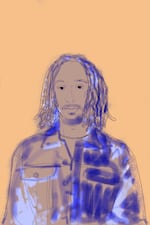The week leading up to trumpeter Theo Croker’s Oct. 8 show in Portland was one of beginnings — the first week of the month, the second week of autumn, and only the second stop on his first extensive American & European tour since COVID-19 brought live music to a halt.
It’s tempting to be dismissive of “quarantine albums” — those much-memed-about projects that musicians of all levels had time to tinker with in 2020 as an alternative to twiddling their thumbs.
It turns out, though, artists of Croker’s creative caliber also made quarantine records — and those albums have emerged as testaments to the depth and richness of artists’ internal worlds.
With new LP “BLK2LIFE || A FUTURE PAST,” Croker offers his most ambitious and lush arrangements yet. They take shape around songs celebrating Blackness and Afro-origin with deep spiritual complexity.
More of a futuristic oratorio than a contemporary jazz record, it’s hard to imagine on listening that almost all of it was composed in quarantine at Croker’s childhood home.
ISABEL: I’m really excited to talk about this album specifically. This feels like the most ambitious and committed thing that you have done so far; it’s the fullest version of you that I have heard on a record. And I want to just start with the literal sounds of it. It’s such a joyful record, even around some of the really big, deep themes that it tackles. It’s difficult to imagine squaring up that joy that you hear in the record with the setting of how it was made, which was in deep COVID quarantine. How did this celebration of a record come out of such a difficult time?
THEO: Well, you know, to be, to be honest, I was in Florida when COVID happened, so nothing really shut down. I chose to go inward and stay inside the house and all those kinds of things, but I didn’t have to. And I was grateful, despite the loss of life and jobs and hardship that it’s brought a lot of people, for the opportunity to stop and sit, and I took advantage of that.
Those things created the environment for the joyful aspect of the music. I didn’t have to tour. I didn’t have a record deal when I made this album. So I wasn’t under any type of pressure. I wasn’t trying to complete something in an album cycle, so I could have another tour cycle, some kind of PR schedule to it. None of that stuff mattered. It was just me making some music, not knowing that the world was gonna end. So I was purely doing it out of my own enjoyment, and music for me is healing, and writing and playing music, for me, is how I find and heal myself. So I did this for me.

Theo Croker. Artist, musician, human being.
D'LEAU
ISABEL: I think you’re describing something that I’ve heard from a lot of music people. Obviously, COVID affected the music industry greatly, but I’ve also heard from a lot of people who feel like it refocused them — gave back a sense of why they are doing this in the first place. The pure making of music in and of itself, separate from touring or a non-stop schedule of just finishing stuff.
THEO: Yeah. And then, you know, as a musician, especially a creative one, who’s not playing pop music — well, I think it’s pop — but it’s never easy, and work is never guaranteed, and all of that. So it wasn’t like, “Oh no, now there’s no work.” I mean, I’ve experienced that multiple times in my 20-year career; it’s nothing new. You’re supposed to take things like that with certain strides. I think the fact that the whole world shut down, I’ve found to be quite enjoyable. It felt like the nineties again, where whatever you were doing in that moment is all that matters.
It was like, if we’re here today at a barbecue, we here at the barbecue, if we in the studio, we in the studio. It just reminded me of those times, pre-social media, pre-artificial urgency of being so concerned with whatever’s happening in whatever country, whatever place at whatever time, even though all you can do is look at it. And it can’t even help you, just looking at it. You being aware, it doesn’t change the situation. So this is that kind of freedom for me — something I needed, especially being on the move for a decade nonstop, and as a result, I was able to create something that was fully present.

Before the world ever heard of COVID-19, Theo Croker brought his energy to Portland. Here he plays at The Jack London Revue in 2019.
David Stuckey / KMHD
ISABEL: That makes a lot of sense and I think perfectly explains the setting of this record and the feeling that it seems like it’s putting out there. Something you just said that I want to ask about while I’m thinking about it, is that you consider this pop music. What do you mean by that? I mean, “pop music,” what does that designation mean to you, in 2021? And why does your music fall under that in your mind?
THEO: Well, popular music has always been some sort of imitation of Black music. And you know, jazz wasn’t called “jazz” until they had to stifle it. So, you know, all I’m doing is just doing the pop music myself without all the hoopla that some pop artists require in order to put a veil over their lack of musicality or artistry. So it’s less about what I’m wearing and who I’m dating and where I’m eating, things like that. And more about just actually allowing the music to be pop — not just meaning excessively popular to the masses, but again, anything from the Rolling Stones to the Beatles to Michael Jackson to Miles Davis to Drake is Black music. In America, it’s coming out of that element of Black music. ‘Cause, that is how America has spoken. I couldn’t say the same in France — I mean, I can, it is also true in France. It’s a Black music thing, but you know, they had their own music before Black people, and America did not.
ISABEL: And that’s a lot of what this record is about, even in just the name. I also want to talk, while we’re on this topic of imagining the headspace you were in while you made this record, about the fact that you were meditating a lot during “lockdown,” or whatever we call it now — so I wanted to know how meditation became part of your life and how you think it informs your music and your creative practice.
THEO: Well, meditation has been a part of my life since around 2013, 2014 — same time I started with being vegan and fruitarian and things like that, taking control of my health. And it started as just that, taking control of my health, because I feel like the systems in place that we grew up with don’t give us any information on our health other than, “Take this pill, take this pill.” So meditation really helps me get a sense of my energy and get control of my energy and allow things that aren’t important to pass through me. It allows me to kind of ground myself beyond the concept of “I” in this social aspect of the world we live in and really connect more with my spirit. You know, playing music for me is a meditation, especially a performance. They feel really similar.
So [meditation] really helps me when I’m playing music. It helps me just access my highest self and my truest self so that whatever it is I’m creating or expressing is most authentic, and powerfully charged because I like to make music with intention — pop music with intention. I’d like to call it “future Black pop,” but the label, you know, they weren’t in a position to let me put that genre on it with the DSPs yet. But it’s future Black pop.

Theo Croker. Artistic representation. King visuals.
D'LEAU
ISABEL: I love that. That’s like a genre that’s beyond genre — which feels true to your music, too.
THEO: In fact, that’s gonna be a record title!
ISABEL: I wanted to ask now more about the thematic material of the record. We talked a little bit about the setting you were in when you wrote it, but the content — it’s so clearly centered around the Black experience, and it does that with so much joy. It feels very much like a celebration. And that’s a contrast that’s noticeable next to the obviously dark parts of how Black folks have lived in reality. And I just want to hear from you about that contrast and what it means to you in this album.
THEO: In general, people of color across the whole planet have been able to take immeasurable amounts of opposition and discrimination with beautiful stride and managed to have, I would say 90% of the time, responded with love and art. So I think that’s something that’s just in the framework of the cultures that experience it.
I mean, it’s my understanding that with energy, there is no situation in which your entire existence can be fueled by only positive energy. You have to transmute negative energy into positive energy. And that creates a yin and yang aspect where the two forces of positive and negative flow together and create a balance, which is centered. I don’t know if that answers your question, but it’s coming from that state of mind.
I’m never coming from the state of mind of like, “Man, I hope nothing challenges me today. I hope nobody’s rude to me today. I hope nobody gives me a ‘no.’” It’s actually more like, “Man, I hope I am challenged today,” because it’s only going to strengthen my spirit and my humanity to be able to respond in a way that doesn’t disturb my peace.
ISABEL: Right. That’s part of the magic of music, too, is that it’s this way to turn that into something that facilitates other people’s peace, too.
THEO: That’s a high level of alchemy, yeah. And that’s on purpose. All the things that were going on with George Floyd and even just — I mean, America be doing some stupid shit. I’m just going to put that out there. And has been for a long time. To even have to sit there and watch the whole world be like, “Oh, we didn’t know,” — even Americans were like, “Oh, we had no idea.” It’s like, “Okay, sure.”
So I guess things like that, you have to just live through. None of that was new for me and other people, that community — we’ve seen this thousands of times. So it’s really more just being committed to making sure that the messages I send out, the vibrations I send out, are coded in positivity, are coded with transmuting negative things into positivity, and are sending out high vibrations, not low.
ISABEL: That’s something that I’ve associated with your music for a long time, that there’s this balance between something that really inspires people to move and let go and have fun — and an intention behind it that’s sometimes way, way bigger than that. It’s very cool to see it playing out in such a beautiful way. And along those lines of dancing and connecting in person, I wanted to ask how it’s feeling to be out and touring again.
THEO: It’s great! I mean, it really kicks out…it really feeds me. My body is a little like, “Woah,” because it’s been almost two years of not traveling like that, and I definitely needed a break after 10 years of traveling like that. But I’m looking forward to it, you know, mixing with different cultures and people, and all the different food and energy and the excitement that people have when you come there just to play and leave. It’s really an enjoyable transient experience to travel around like that.
At the time of this story’s publishing, Theo Croker’s next live date is a tribute to Miles Davis alongside members of the Berlin Philharmonic in Berlin, Germany. Though there’s no return to Portland on the books yet, rest assured our eyes are peeled and ears are open.
All artistic visuals by D’LEAU
Stream “BLK2LIFE || A FUTURE PAST” here:

